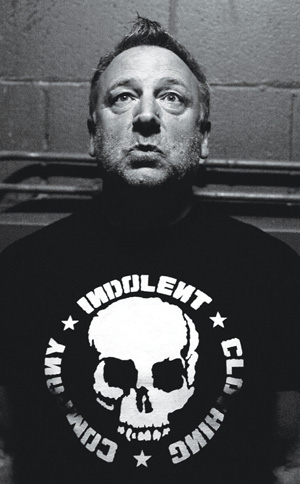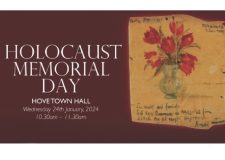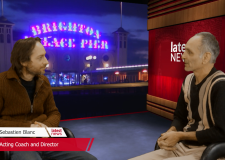Interview: Peter Hook from Joy Division

The Hook Up
As a founder member of one of the most influential bands of all time, Joy Division, it’s all come full circle for Peter Hook, as he explains to Jeff Hemmings
Interest in Joy Division, a band that barely lasted three years, continues to be very high, 32 years after the suicide of lead singer Ian Curtis in 1980. The superb Anton Corbijn film Control of 2007, based on the biography of Ian Curtis by his wife, Deborah, in particular drew attention to the music of this archetypal post-punk band – a band that channelled the anger and energy of punk into music that emphasised mood and expression.
Peter Hook was a founder member of Joy Division, as well as New Order that took over following Curtis’s death. He wrote The Hacienda: How Not To Run A Club, which became an unexpected hit, encouraging him to write about Joy Division. “I read Mick Middles’ book on Joy Division, and I thought ‘why do all these people write about Joy Division, who weren’t there?’ Ding! Another lightbulb moment.
“The Joy Division book looked like it would be dead easy; it only lasted a short while, top to tail, and we were only professional for six months, if you can call professional getting £7 a week. As it turned out, it was bit easier than the Hacienda book because I’d already been down that road.”
“There’s no two ways about it, Martin Hannett created the Joy Division sound”
Unknown Pleasures was the band’s first of only two studio albums they made. They initially disliked the spacious, atmospheric sound of the album, which did not reflect their more aggressive live sound. Hook said in 2006; “It definitely didn’t turn out sounding the way I wanted it…but now I can see that Martin (Martin Hannett, the record’s producer) did a good job on it. There’s no two ways about it, Martin Hannett created the Joy Division sound.” With the publication of the book, Hook and his band, The Light, are about to go on tour of the UK, performing Unknown Pleasures in the order on the original vinyl as well as a number of singles/B-sides and rarities including pre-Joy Division tracks, when the band were known as Warsaw and released the EP An Ideal For Living, and the previously ‘lost’ Joy Division track ‘Pictures In My Mind’.
“The amount of work we put into making it flow, with Martin Hannett, was incredible. And it’s something that has stuck with me right the way through our whole career – you write the songs, you record the songs, and then the biggest job is putting them in an order where you’re happy to listen to them, and that to me is a lost art. Even now, I will put an album on – Cockney Rebel’s Human Menagerie, Roxy Music’s first album, Nico’s Chelsea Girls, New Boots And Panties (Ian Dury & The Blockheads), and I’ll enjoy the whole ambience of that world, in that period of time.”

Unknown Pleasures was never a commercial success at the time of its release, but it did enough to kickstart Factory Records as a going concern and was a critics choice, making number three at the 1979 end-of-year NME’s Best Albums list. It wasn’t until the end of ‘79 when the band toured with The Buzzcocks that they became full-time professionals, and in the spring of 1980 they entered the studio, again with Martin Hannett, to record their second and last album, Closer.
But, on 18 May 1980, after the album had been recorded and on the eve of an American tour, Ian Curtis committed suicide.
“The thing that is most upsetting about it is that Ian worked as hard as any of the rest of us did, and the fact that it was snatched from him, and he didn’t get it back, and we got it back, it still upsets me now.
“I was sort of hoping for some sort of salvation [by writing the book], but I still feel as guilty as I have done. You’ve got excuses: you were young, you didn’t know, you went along with the crowd, a million excuses you could put forward, but when it comes down to it you didn’t stop your mate killing himself. There is always a guilt to it, and because Joy Division became bigger and more culturally important over the years I suppose you are never going to lose that. There were more experienced, older and intelligent people than me there, they didn’t see it either.”

Tony Wilson (Factory label boss) said in 2005: “I think all of us made the mistake of not thinking his suicide was going to happen…we all completely underestimated the danger. We didn’t take it seriously. That’s how stupid we were.”
“The thing you wanted Ian to say most to you was that he was alright; whenever you asked him he would say, ‘I’m alright, let’s get going’,” says Hook.
Of course, without the re-invention of Joy Division as New Order, Hook would not be here today. And the mythologising of Joy Division hasn’t hindered either: “Tony Wilson always said to me, ‘don’t let the truth get in the way of a good story’, so there’s an element of mythology that always helps. If you look at the 24 Hour Party People film there are a lot of things that are wrong, which used to annoy me, but now I find it quite funny. I was aware when doing the Joy Division book not to bust too many myths, and some of them are quite nice. Some of them are true, like Tony doing the contract in blood. I am respectful of the place the band holds; what surprises me about ‘the others’ was they thought I was going to stitch them up. I honestly feel that they do not know me at all, if that is what they thought – that I would do such a cheap trick. Something that was so important to my life, I couldn’t believe that – I found that really sad.” Hook is, of course, referring to his fellow band members Bernard Sumner and Stephen Morris, from whom he finally split in 2007. “It was a bit like Turkey and Syria – there was no consultation with the others. That about sums it up really; we are at each others throat.”
At first, Hook didn’t fancy playing Joy Division sets in the UK. “I never wanted to play it here – because of the keyboard terrorists that were after me and the bad feeling that people expressed about me doing this. I just thought, ‘fuck it’, and I got offers abroad to play it and that is what I did. It was my new management who asked me why I never played in England. I said, “I don’t like the English, nasty!’ They thought I was missing a trick, and lo and behold, I did a small tour recently, and it was great.
“Playing Joy Division to celebrate Ian Curtis’s 40th anniversary gave me a new lease of life; I thought I was going to be a DJ from then on. And it’s lovely to have my son play bass in the band. The only unfortunate thing is the reaction of the rest of the band, very sad. But that’s life, these things are meant to try us.”
As to the future, well of course, there’s the long history of New Order to write about. “The next one will be the New Order. I wasn’t going to because New Order fell into the pitfalls (of excess) as every other rock ’n’ roll band did in the ’80s and ’90s, and there’s lots I can’t remember! We weren’t party to any of that excess with Joy Division, we were quite pure. A lot of people say, ‘the nice thing about your book is that it isn’t full of groupies and drugs’. I’ve told them to wait for the New Order one”, he laughs.
Peter Hook And The Light, Concorde 2, Wednesday 28 November, £20, 01273 673311, www.concorde2.co.uk





















